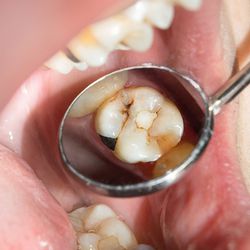
You may have noticed that some dentists have different letters at the end of their names. For example, Dr. Abelar’s title is “Martin P. Abelar, DDS.” You may have also noticed other dentists who have the letters DMD at the end of their name. So, what’s the difference between DDS and DMD? And while we’re on the subject, what’s the difference between a dentist, periodontist, orthodontist and maxillofacial surgeon? Or between a dental hygienist and a dental assistant? Is one more qualified than the other? Here’s the lowdown on the differences in titles and abbreviations in dentistry.
DDS
The letters “DDS,” such as in Dr. Abelar’s title, stand for Doctor of Dental Surgery. A Doctor of Dental Surgery is someone who graduated from an accredited dental school. To earn a Doctor of Dental Surgery title, your dentist must attend at least three years of undergraduate school and then an additional four years of dental school. Your dentist must also pass a national exam and a state exam, which grants him or her a license to practice. Once your dentist has earned his license, he’s still not done learning – he must attend a minimum number of continuing education hours annually to stay both licensed and accredited or certified with a national dental board.
DMD
The title DMD at the end of some dentists’ names stands for Doctor of Medicine in Dentistry, or sometimes it may mean Doctor of Dental Medicine. So, what’s the big difference between a DMD and DDS? Believe it or not, the only difference is the school your dentist attended. That’s because different schools use different titles when they grant their degrees – there’s literally no difference in the information a DMD and a DDS are taught in dental school. In fact, you could transfer from a school that issues a DMD to a school that issues a DDS and have no change in curriculum!
Maxillofacial Surgeon
Sometimes in dentistry, a patient may be referred to an oral and maxillofacial surgeon. This specialized field of dentistry deals specifically with defects, injuries and diseases of the hard and soft tissue of the mouth, face and jaw. These specialists may be requested to complete procedures like removing wisdom teeth and repairing injuries to the face. A maxillofacial surgeon must not only earn his or her dental degree, but he or she must also undergo an additional hospital-based residency for four years.
Periodontist
A periodontist is a dentist who specifically treats the gums. These specialists are often called upon to treat issues like advanced periodontitis or receding gums. A periodontist must earn the DDS or DMD degree and then attend an additional three years of clinical training focusing specifically on the gums.
Orthodontist
An orthodontist is a dentist who specializes in the alignment of the teeth, jaw, mouth and gums. Orthodontists work to align these parts in a way that is both aesthetically and physically ideal for the patient. After all, a bad bite doesn’t just look bad – it can also cause pain, uneven tooth-wear and even serious conditions like sleep apnea. An orthodontist must attend four years of dental school and earn a DDS or DMD, and then attend an additional two to three years of orthodontic training.
Dental Assistant
Dental assistants are often confused with dental hygienists, but the two roles are not interchangeable. To become a dental assistant, one must undergo a certificate or diploma program. A dental assistant is generally responsible for doing things like taking X-rays, sterilizing equipment and educating patients on proper hygiene. They may also help make tooth impressions and assist dentists during procedures.
Hygienist
A dental hygienist may often perform the same duties as a dental assistant but is also trained to do much more. Hygienists must earn an associate’s or bachelor’s degree. In addition to doing everything an assistant can do, they can also clean teeth, apply fluoride, remove sutures and administer anesthesia.
Ready to schedule an appointment with Dr. Abelar? Give the office a call at 858-866-9692.






